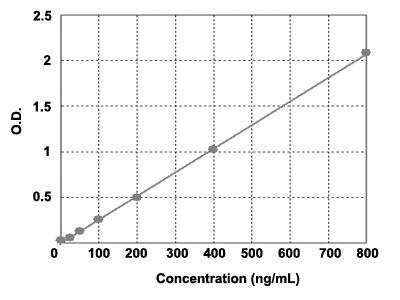Vimentin: ELISA Kits
Vimentin is a 57 kDa structural protein that belongs to the intermediate filament family. As such, it plays a key role in maintaining cell integrity, and is involved in cell migration and adhesion. Vimentin is ubiquitously expressed during early embryonic development, but it is gradually replaced in many cell types by more specific intermediate filaments. Postnatal expression of vimentin is restricted to mesenchymal cells, endothelial cells, fibroblasts, macrophages, leukocytes, and renal tubular cells. Vimentin has also been found to be overexpressed in a variety of epithelial cancers, where it is associated with accelerated tumor growth and metastasis.
As a marker of mesenchymal cells, upregulation of vimentin expression has been used as a marker of the epithelial to mesenchymal transition (EMT) that occurs during tumor metastasis. The process of EMT results in a reduction in cell adhesion and increased cell motility and migration of the transitioning cell. The involvement of vimentin in this process has led to its investigation as a potential target for cancer therapy. More recently, extracellular vimentin has also been found to bind to the SARS-CoV-2 Spike protein and increase ACE2-dependent viral entry and SARS-CoV-2 infection in endothelial cells.
Products:
1 result for "Vimentin ELISA Kits" in Products
1 result for "Vimentin ELISA Kits" in Products
Vimentin: ELISA Kits
Vimentin is a 57 kDa structural protein that belongs to the intermediate filament family. As such, it plays a key role in maintaining cell integrity, and is involved in cell migration and adhesion. Vimentin is ubiquitously expressed during early embryonic development, but it is gradually replaced in many cell types by more specific intermediate filaments. Postnatal expression of vimentin is restricted to mesenchymal cells, endothelial cells, fibroblasts, macrophages, leukocytes, and renal tubular cells. Vimentin has also been found to be overexpressed in a variety of epithelial cancers, where it is associated with accelerated tumor growth and metastasis.
As a marker of mesenchymal cells, upregulation of vimentin expression has been used as a marker of the epithelial to mesenchymal transition (EMT) that occurs during tumor metastasis. The process of EMT results in a reduction in cell adhesion and increased cell motility and migration of the transitioning cell. The involvement of vimentin in this process has led to its investigation as a potential target for cancer therapy. More recently, extracellular vimentin has also been found to bind to the SARS-CoV-2 Spike protein and increase ACE2-dependent viral entry and SARS-CoV-2 infection in endothelial cells.
Products:
| Applications: | ELISA, NULL |

